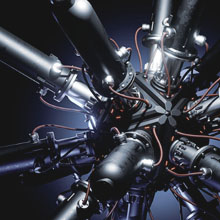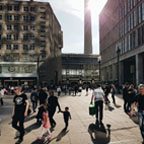|
In this issue... Engineering solutions in the fight against climate change
|
Engineering solutions in the fight against climate change |
| We’re living in a “throwaway culture.” Gone are the days of reusable, refillable milk jugs; now, we throw away plastic milk bags and buy more at the grocery store when needed. Somewhere along the way, we collectively decided it was more convenient—and more advanced, perhaps—to place our social and industrial value in what is new and accessible rather than what is reusable and sustainable. When this shift began, we thought our resources would last forever. But now that we know better, it’s our responsibility to do better. |
|
|
|

|
|
Upstream opportunities for vSMRs in growing green economy |
| Clean technologies form the basis of our ongoing transition to a greener economy. Low-carbon emitting technologies such as electric vehicles (EVs), energy storage, and renewable power like wind and solar are gaining prominence, and their demand continues to grow.
|

|
| Welcoming input from regional community groups: a roadmap for nuclear success |
| Alongside the benefits of replacing conventional power plants with small modular reactors, should we also be considering other long-standing issues before throwing the nuclear switch?
|
|
|
|
|
 |
| Successful project delivery lies in the balancing act of community well-being |
| The balance between environmental protection and economic activity is a key determining factor for any activity in Indigenous communities. To successfully close the existing gap and increase well-being for all Canadians, we need a renewed focus on key success factors.
|

|
| More than a checklist: the role of meaningful community engagement |
| There’s increased interest and a rising trend of businesses starting to prioritize environmental, social, and governance (ESG) issues around the globe. Companies involved in the metals and mining, energy, and infrastructure industries in particular have the potential to improve environmental risk, advance community development, and generate revenue in the areas in which they operate.
|

|
| Community first, engineering next |
| The difference between community engagement and meaningful community engagement ultimately amounts to one word: respect. The impact of it, however, can generate a drastic positive difference.
|
|
|
|
|
| Local community development is changing the future of our industries |
| We all know that we’re meant to demonstrate a sense of corporate social responsibility when it comes to sustainability. This idea isn’t new. But companies that genuinely embrace and deeply integrate their corporate social responsibility initiatives do so because they understand that it not only benefits others, it has a significant positive impact on their bottom lines.
|
|
|
|
| Hatch has partnered with the Niagara Falls Ryerson Innovation Hub (NFRIH) to open the first public makerspace in Niagara Falls, Ontario. This new collaboration between Hatch and NFRIH is the result of a common desire to encourage innovation and meet the needs of entrepreneurs across Niagara Falls and the region who are seeking a space to bring their ideas to life. Read more »
|
| Hatch recently hosted our 53rd annual H.G. Acres Symposium at our office in Mississauga, Ontario. The event brought together twelve presenters from the power industry, along with clients, partners, and Hatch colleagues, to delve into the theme of “Powering Positive Change” and discuss hydropower and its key role in the clean energy transition. Read more »
|
| Anneri Robinson, a rail and transit systems and operational lead at Hatch was awarded one of the Women in Rail Awards for 2022 by International Railway Journal. She is recognized for her experienced leadership, proven contributions to the industry, and dedicated involvement in the community. Read more »
|
|
|
|